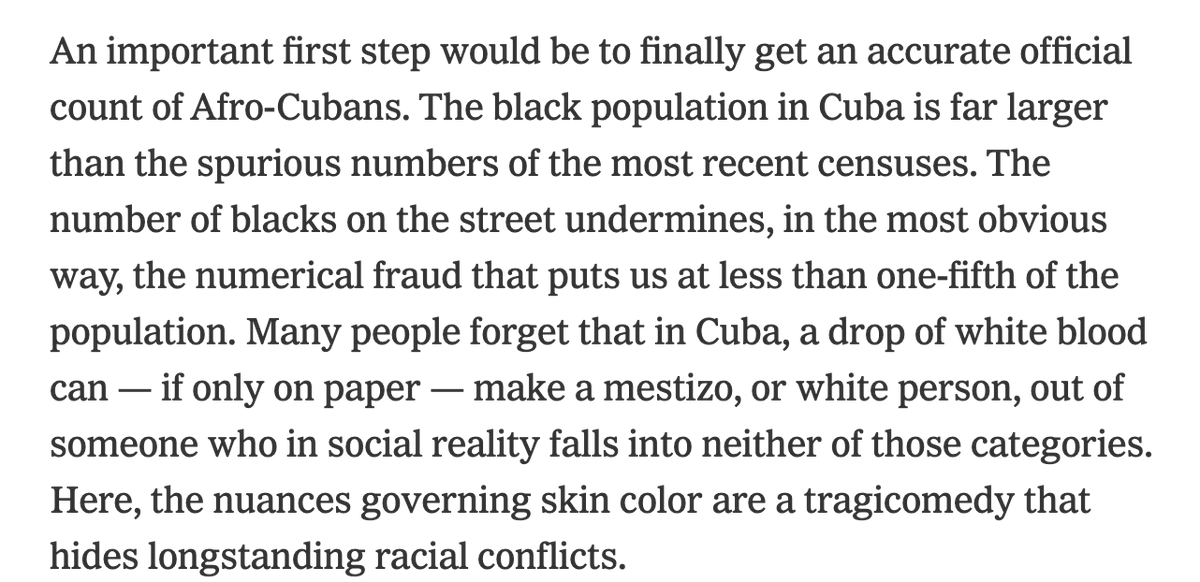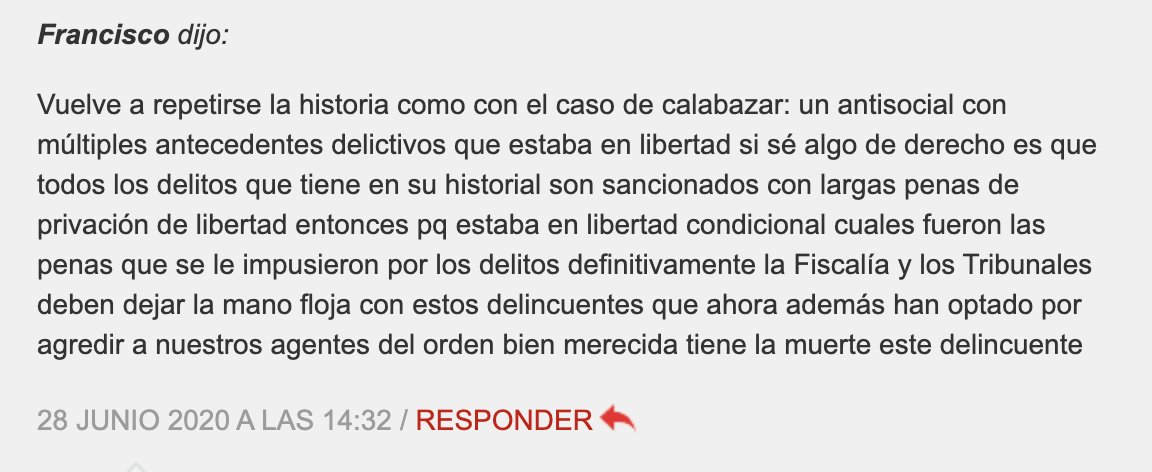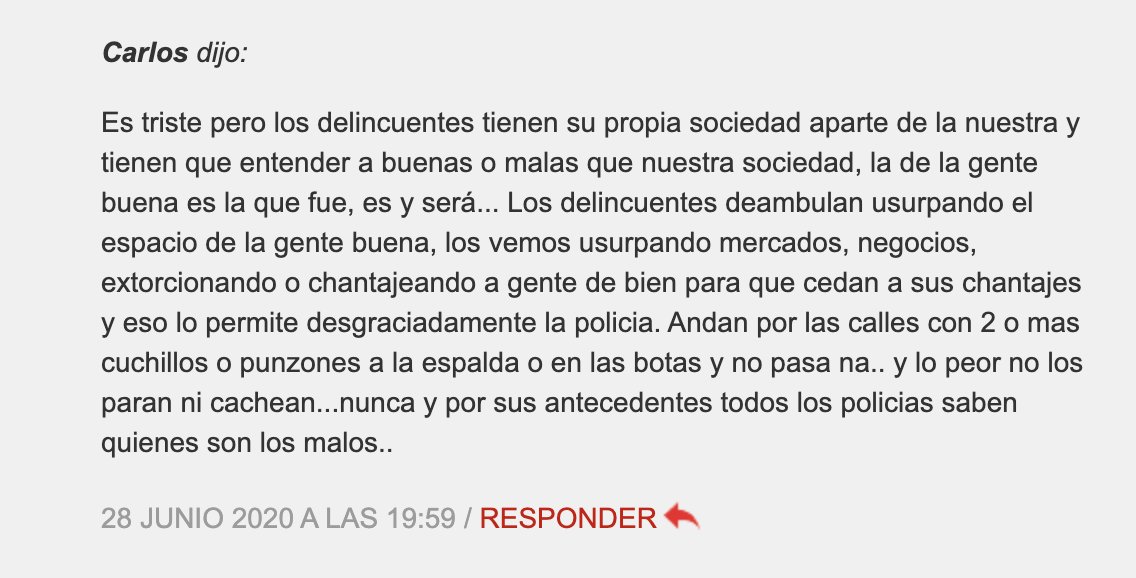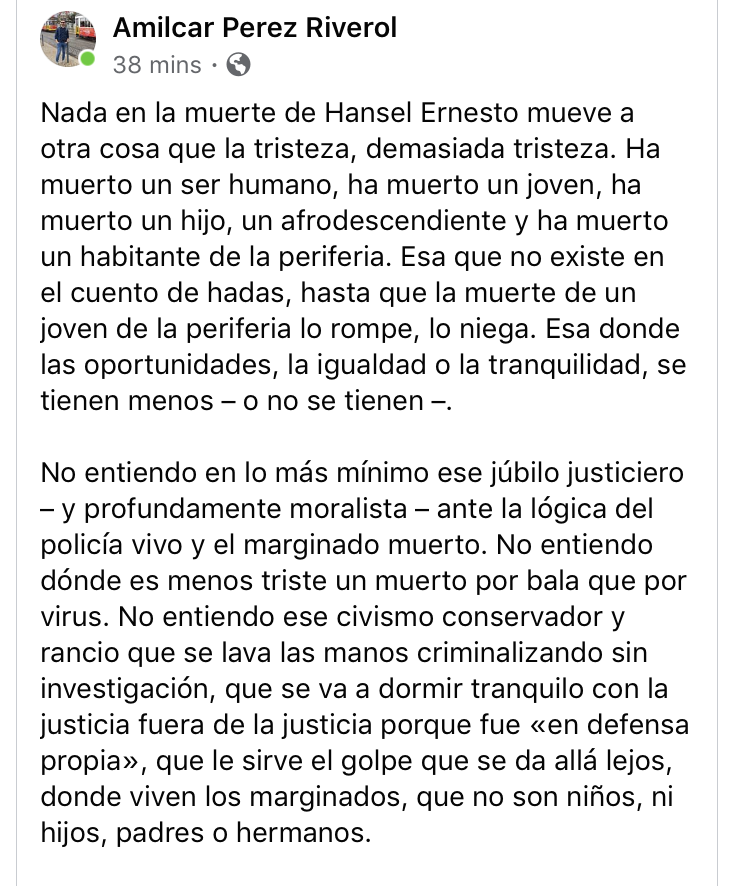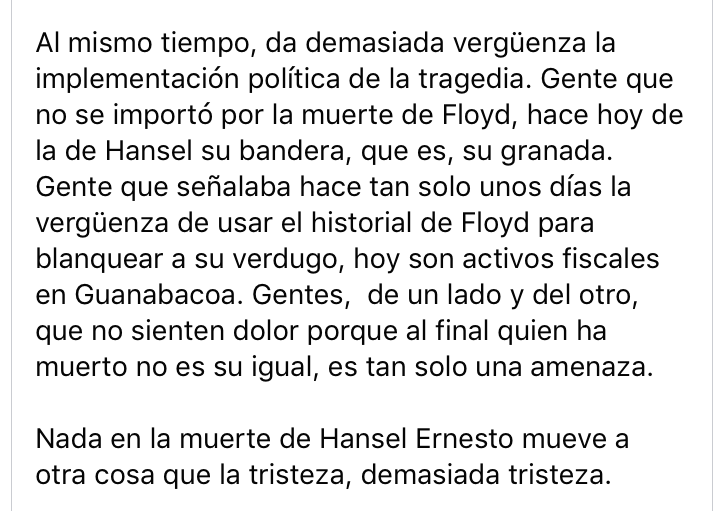For the past few weeks, Cuban media have closely covered the death of George Floyd, and the Black Lives Matter protests that have emerged around the world in response. As they should.
(THREAD)
(THREAD)
But when a young black Cuban, Hansel Ernesto Hernández, was shot and killed under questionable circumstances in a confrontation with police last week, those same media outlets did not ask the questions that folks are asking of similar incidents in the U.S. and around the world.
Instead, they limited themselves to reproducing an official statement, which, as @collinlaverty11 points out, was problematic in all sorts of ways. https://twitter.com/collinlaverty11/status/1277023982127067136?s=20
One does not have to believe that Hansel Ernesto Hernández is "un George Floyd cubano," or even that the degree of police violence in Cuba is akin to that in the United States, to ask whether the use of force here was justified, to at lesat demand an investigation be launched.
But the fact is, there IS lots of anecdotal evidence that Cuba does have a problem with not only structural racism, but also discriminatory policing, which suggests that the analysis of this case needs to be conducted under a broader frame.
(And if Hernández was shot in the back—even if he was guilty of theft and had thrown rocks at police while fleeing—the appropriate analogy might be Rayshard Brooks, not George Floyd.)
Part of problem is that we dont have great data on the basics in Cuba, let alone use of force statistics.
For starters, many argue that the Cuban census seriously underreports the number of citizens that identify as or experience life as black.
(See https://www.nytimes.com/2013/03/24/opinion/sunday/for-blacks-in-cuba-the-revolution-hasnt-begun.html?auth=login-email&login=email)
For starters, many argue that the Cuban census seriously underreports the number of citizens that identify as or experience life as black.
(See https://www.nytimes.com/2013/03/24/opinion/sunday/for-blacks-in-cuba-the-revolution-hasnt-begun.html?auth=login-email&login=email)
Nor do we do know what % of Cuba's currently incarcerated population is people of color (anecdotally, it is high), or how that compares to their representation in the population as a whole and/or racialized patterns of economic inequality.
But as various indicators in articles like this suggest, the problem of racial stratification in Cuba on many metrics runs deep. At the very least it is fair to ask whether it does in Cuba's criminal justice system too. https://www.nytimes.com/2019/05/28/opinion/cuban-revolution-racism.html
All of this is symptomatic of a broad contradiction with regard to how dominant Cuban actors (state leaders, media, etc.) have handled race since the early 1960s:
Active, ongoing sympathy for anti-racist activists, politics, and struggles abroad...
(IE Here in the 60s:) https://vimeo.com/241041700
(IE Here in the 60s:) https://vimeo.com/241041700
(Or here in 2020:) http://www.cubadebate.cu/noticias/2020/06/29/beyonce-anuncia-el-lanzamiento-de-black-is-king-nuevo-album-que-homenajea-la-lucha-de-la-comunidad-negra/#.Xvt2x5NKjeo
But a frequent short-circuiting of the conversation internally, under presumption that racism was basically "solved" by eliminating segregated spaces and institutions by 1962, or that what remains of it are "vestiges" of past rather than structural part of Cuban society today.
(See this reference to "vestiges" from a government press release the other day, ironically in connection to a state program created to address the long ignored demands of anti-racist activists on the island.)
http://www.minrex.gob.cu/es/diaz-canel-tenemos-la-obra-de-la-revolucion-delante-y-hay-que-defenderla-con-pasion
http://www.minrex.gob.cu/es/diaz-canel-tenemos-la-obra-de-la-revolucion-delante-y-hay-que-defenderla-con-pasion
This is not to deny that many Cubans of color experienced significant upward mobility in the 1960s, 70s, 80s—yes, as a result of socialist policies, or that race operates differently in many ways in Cuba than in U.S. society.
See: https://www.google.com/books/edition/A_Nation_for_All/IKbE897heBcC?hl=en&gbpv=0
See: https://www.google.com/books/edition/A_Nation_for_All/IKbE897heBcC?hl=en&gbpv=0
Still, after 1962, talk of race inside Cuba was generally avoided, or was done in code: like in social science and media discourses focused on the difficult "integration" of "marginal" (generally code word for black) communities. That is still often the case today.
(Worth recalling: Cuban govt invited Oscar Lewis to Cuba in the late 60s. Researchers were interested in applying his "culture of poverty" thesis to Cuba's efforts to "rehabilitate" former slum communities. We know how Lewis's ideas fueled a pathology around race in the US.)
In case of Hansel Ernesto Hernández, we see a recycling of these discourses, which justify his shooting by reference to his "delincuencia," "marginalidad," his "antisocial" record—all words that can conjure associations w race.
In sum: the frequent comparison of Cuban race relations with the "more severe" problems of race relations in the United States—a comparison with a deep history in Cuba predating and after 1959—has both a fraught politics and is often deployed w instrumental aims.
It works to impede a necessary reckoning on topics like racial profiling, inequities, and policing in Cuba today.
The sympathetic coverage of the death of Floyd, and the uncritical acceptance of the police's version of the death of Ernesto Hernández, proves this point.
The sympathetic coverage of the death of Floyd, and the uncritical acceptance of the police's version of the death of Ernesto Hernández, proves this point.
Yet I concur wholeheartedly with this commenter when he calls out political instrumentalism in terms of the attention this case has garnered in some corners outside of Cuba too (though I depart from his use of the loaded word "marginal").
That is, it is rich to see diaspora media that covered the BLM protests in Miami so unfavorably, or that continue to be echo chambers for the denial of racism in the United States, position themselves as sympathizers in Ernesto Hernández's case. https://cubanosporelmundo.com/2020/06/26/cubana-alexis-valdes-el-racismo-en-miami/
Seems silly to state this reminder, but Cuban antiracist activists have long been clear: to combat racism in Cuba, they do not need to ignore racism in the United States. Nor to express solidarity with anti-racist struggles abroad must they ignore or downplay racism at home.
For them—whether in the 1920s or the 2020s—the struggle against racism must be transnational and relational if it is to be consecuente. We would do well, I think, to follow their lead.
(Suggested reading: https://uncpress.org/book/9780807871034/forging-diaspora/)
(Suggested reading: https://uncpress.org/book/9780807871034/forging-diaspora/)

 Read on Twitter
Read on Twitter